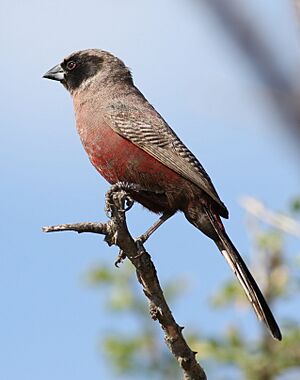Black-faced waxbill facts for kids
Quick facts for kids Black-faced waxbill |
|
|---|---|
 |
|
| Conservation status | |
| Scientific classification | |
| Genus: |
Brunhilda (bird)
|
| Species: |
erythronotos
|
| Synonyms | |
|
Estrilda erythronotos |
|
The black-faced waxbill (Brunhilda erythronotos) is a small, colorful bird often seen in southern Africa. It's a type of estrildid finch, known for its pretty songs and social nature.
You can find these birds in many countries across Africa. They live in places like Angola, Botswana, Kenya, Namibia, Rwanda, South Africa, Tanzania, Uganda, Zambia, and Zimbabwe.
Good news for these birds! The IUCN (International Union for Conservation of Nature) says the black-faced waxbill is a species of least concern. This means there are lots of them, and they are not currently in danger of disappearing.
Contents
Understanding Black-faced Waxbill Names
Scientists use a special system called taxonomy to name and group all living things. This helps everyone around the world know exactly which animal or plant they are talking about.
Who Named the Black-faced Waxbill?
The black-faced waxbill was first officially described in 1817. A French bird expert named Louis Pierre Vieillot gave it its first scientific name, Fringilla erythronotos.
What Does Its Name Mean?
The name erythronotos comes from ancient Greek words. Eruthros means "red," and -nōtos means "-backed." So, the name describes a bird with a red back!
Where Was It First Found?
The first black-faced waxbill studied by scientists came from a place called Kurrichane. This area is now known as Kaditshwene, located in the North West province of South Africa.
Why Did Its Name Change?
For a long time, this bird was placed in a group called Estrilda. But in 2020, scientists did new studies using advanced methods to look at bird DNA. These studies showed that the Estrilda group wasn't quite right.
Because of this new information, the black-faced waxbill was moved to a different group called Brunhilda. Another bird, the black-cheeked waxbill, also joined this group.
Different Types of Black-faced Waxbills
Even within the same species, there can be slight differences depending on where the birds live. These different groups are called subspecies. Scientists recognize two subspecies of the black-faced waxbill:
- B. e. delamerei (Sharpe, 1900) – You can find this subspecies in southwest Uganda, western Kenya, and central Tanzania.
- B. e. erythronotos (Vieillot, 1817) – This subspecies lives in Angola and Namibia, stretching all the way to Zimbabwe and northern South Africa.


